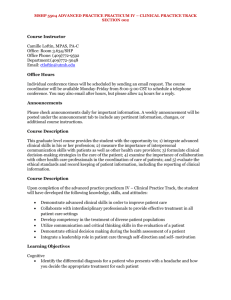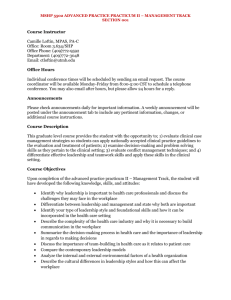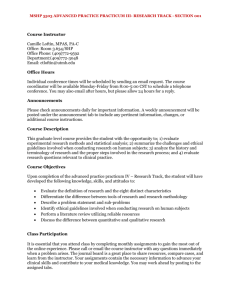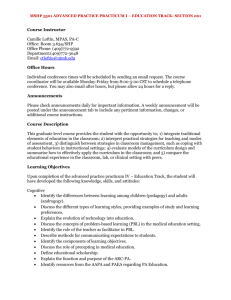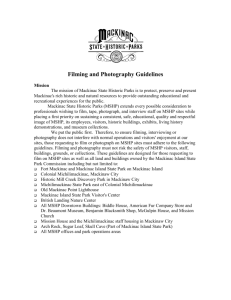MSHP 5504 ADVANCED PRACTICE PRACTICUM IV
advertisement
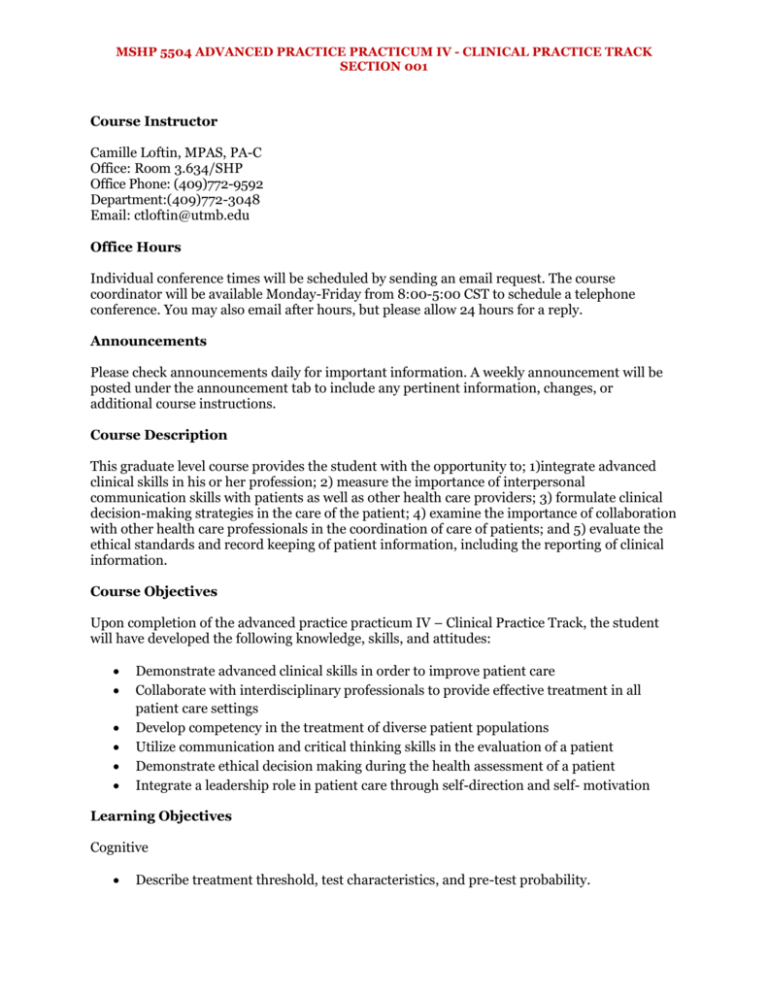
MSHP 5504 ADVANCED PRACTICE PRACTICUM IV - CLINICAL PRACTICE TRACK SECTION 001 Course Instructor Camille Loftin, MPAS, PA-C Office: Room 3.634/SHP Office Phone: (409)772-9592 Department:(409)772-3048 Email: ctloftin@utmb.edu Office Hours Individual conference times will be scheduled by sending an email request. The course coordinator will be available Monday-Friday from 8:00-5:00 CST to schedule a telephone conference. You may also email after hours, but please allow 24 hours for a reply. Announcements Please check announcements daily for important information. A weekly announcement will be posted under the announcement tab to include any pertinent information, changes, or additional course instructions. Course Description This graduate level course provides the student with the opportunity to; 1)integrate advanced clinical skills in his or her profession; 2) measure the importance of interpersonal communication skills with patients as well as other health care providers; 3) formulate clinical decision-making strategies in the care of the patient; 4) examine the importance of collaboration with other health care professionals in the coordination of care of patients; and 5) evaluate the ethical standards and record keeping of patient information, including the reporting of clinical information. Course Objectives Upon completion of the advanced practice practicum IV – Clinical Practice Track, the student will have developed the following knowledge, skills, and attitudes: Demonstrate advanced clinical skills in order to improve patient care Collaborate with interdisciplinary professionals to provide effective treatment in all patient care settings Develop competency in the treatment of diverse patient populations Utilize communication and critical thinking skills in the evaluation of a patient Demonstrate ethical decision making during the health assessment of a patient Integrate a leadership role in patient care through self-direction and self- motivation Learning Objectives Cognitive Describe treatment threshold, test characteristics, and pre-test probability. MSHP 5504 ADVANCED PRACTICE PRACTICUM IV - CLINICAL PRACTICE TRACK SECTION 001 Explain clinical preventive measures recommended by the U.S. Preventive Services Task Force (USPTF) for normal-risk adults Discuss the difficulty of working with difficult patients and how you can manage the patient differently Describe the different treatments for headaches and how you decide the appropriate treatment for each patient Identify the signs and symptoms of chest pain in a patient in the primary care setting Distinguish the difference between streptococcal infection and viral causes of pharyngitis. Discuss the Centor criteria and the importance of using it when evaluating a patient Differentiate the difference between sinusitis, bronchitis, and pharyngitis Discuss the dermatologic evaluation of a patient in the primary care setting Differentiate between different types of hypertension drugs, including the advantages and disadvantages Describe the first-line therapy for hypertension in patients with diabetes and the cornerstone of therapy for type 2 diabetes Describe COPD, including the definition, epidemiology, risk factors, pathophysiology, diagnosis, and management Explain the difference between fibrocystic breast disease and fibroadenomas Discuss the algorithm for the evaluation of a palpable breast mass Discuss the importance of patient education and how the PA plays a vital role in educating a patient Discuss the benefits and risks of hormone replacement therapy (HRT) Affective Recognize the different techniques of communicating with patients Appreciate the difficulty in treating insomnia and how to approach a patient with sleep difficulties Recognize the signs and symptoms of a patient with abdominal pain and describe how you would approach the patient with chronic abdominal pain Appreciate the difficulty of being compliant with hypertension treatment due to the cost of medication and lifestyle modifications Recognize the different definitions of fever and current treatment options Class Participation It is essential that you attend class by completing monthly assignments to gain the most out of the online experience. Please call or email the course instructor with any questions immediately when a problem arises. The journal board is a great place to share resources, compare cases, and learn from the instructor. Your assignments contain the necessary information to advance your clinical skills and contribute to your medical knowledge. You may work ahead by posting to the assigned tabs. MSHP 5504 ADVANCED PRACTICE PRACTICUM IV - CLINICAL PRACTICE TRACK SECTION 001 Graded Criteria Assignments 13 x 50 points each Journal Posts 7 x 50 points each Total points 650 350 1000 End of Course Survey Grading Scale 1000-900 900-800 800-700 500-700 A B C F Pass/Fail Grading Rubric To be awarded maximum points the following must be completed: Exceptional (A) Meet Expectations (B) Includes critical thinking and analytical content and insight Follows APA format exactly Some critical thinking and analytical content and insight Follows APA format with some minor corrections Needs Improvement (C) Little critical thinking and analytical content and insight included Does Not Meet Minimum Requirements (F) No critical thinking and analytical content and insight included Follows APA format with many corrections Does not follow APA format Late Assignments Failure to turn in any assignment will result in a 10% deduction in grade for being late, followed by a 10% per day penalty thereafter. Academic Integrity Academic dishonesty includes, but is not limited to, cheating, plagiarism, collusion, the submission for credit of any work or materials that are attributable in whole or in part to another person, taking an examination for another person, and any act designed to give unfair advantage to a student or the attempt to commit such an act. Procedures to be followed in the event of alleged academic dishonesty are described in the Rules and Regulations of the Board of Regents of The University of Texas System, and the SHP Student Handbook found at http://shp.utmb.edu. Alleged academic dishonesty issues should be reported to the Associate Dean for Academic and Student Affairs. Citation Requirements You must use APA 6th edition to cite all sources. Use 12 font, Times New Roman, one inch margins. Please refer to the: MSHP 5504 ADVANCED PRACTICE PRACTICUM IV - CLINICAL PRACTICE TRACK SECTION 001 American Psychological Association. (2010). Publication manual of the American Psychological Association (6th ed.). Washington, DC: APA Press. ISBN: 978-1-4338-0561-5 Required Textbooks Primary Care Mentor: Your Clerkship & Shelf Exam Companion (Davis's Mentor) Green, Bierman, Foody, Robertson, Martin ISBN-10: 0803621256 | ISBN-13: 978-0803621251 | Publication Date: February 26, 2009 | Edition: 1 The 5-Minute Clinical Consult 2012: Standard W/ Web Access (Domino 5 Minute Clinical Consult (Book Only)) [Hardcover] Domino, Baldor, Golding, Grimes, Taylor ISBN- 1451103034 | ISBN-13: 978-1451103038 | Publication Date: April 2011 | Edition: 20 Har/Psc (You may purchase the book only or the premium version. It will also be used in Clinical Practice Track 2 and is very useful in the clinical setting) Software and Hardware Requirements Blackboard Help for Students can be found at (http://help.blackboard.com/student/index.htm). Supported browsers for Release 9.1 can be found at http://kb.blackboard.com/pages/viewpage.action?pageId=72810639. Assignments Phase I: Approach to the Patient/Preventive Care/Prevention and Screening Assigned Readings: Primary Care Mentor: Pages 1-4, 8-15, 17-58 MSHP 5504 ADVANCED PRACTICE PRACTICUM IV - CLINICAL PRACTICE TRACK SECTION 001 Clinical experience and pre‐test probability scores in the diagnosis of pulmonary embolism - http://qjmed.oxfordjournals.org/content/96/3/211.full Management of the Difficult Patient - http://www.aafp.org/afp/2005/1115/p2063.html Assignment 1: Identify an article regarding the role of the Physician Assistant in patient education. In 1-2 pages, discuss the importance of patient education and how the PA plays a vital role in educating a patient. Assignment 2: Use table 4.3 on page 50 in the text. In 2-3 pages, discuss the clinical preventive services recommended by the USPTF. Discuss a clinical scenario in which you have applied these preventive measures for a normal-risk adult. Discuss the patient history and family history to justify your recommendations. Assignment 3: After reading the article Management of the Difficult Patient, in 2-3 pages discuss the difficulties you have had with a difficult patient and how you handled it. What could you do differently next time? Assignment 4: In 2-3 pages, briefly describe the treatment threshold, test characteristics, and pre-test probability. Journal Post 1: Describe your technique of communicating with patients. What could you do differently to improve your communication skills with patients? Phase II: Diagnosis and Management of Common Outpatient Symptoms Assigned Readings: Primary Care Mentor: Pages 77-232 The 5-Minute Clinical Consultant: Pages 148-149, 556-558, 702, 802-803 A-2, A-3, A-4, A-42, Assignment 5: In 2-3 pages discuss the treatment for headaches. Discuss a clinical case and how you approached the patient with headaches, including the treatment plan and followup care. Assignment 6: Insomnia can be difficult to manage. In 2-3 pages explain the treatment for insomnia. Discuss your professional opinion, using your clinical experience on what treatment is most effective. Assignment 7: In 2-3 pages discuss the signs and symptoms of chest pain. What is your approach to the patient with chest pain? Assignment 8: It is critical to distinguish the difference between streptococcal infection and viral causes of pharyngitis. In 2-3 pages, discuss the Centor criteria and distinguish the difference between sinusitis, bronchitis, and pharyngitis. Journal Post 2: What is your approach to the patient with abdominal pain? Use the information in the book to justify why you have used this approach. MSHP 5504 ADVANCED PRACTICE PRACTICUM IV - CLINICAL PRACTICE TRACK SECTION 001 Journal Post 3: Discuss the dermatologic evaluation of a patient in the primary care setting. Discuss the different types of skin cancer and the distinguishing factors. Phase III: Diagnosis and Management of Common Chronic Illnesses Assigned Readings: Primary Care Mentor: Pages 269-346 The 5-Minute Clinical Consultant: Pages 648-653, A-43, A-106, Assignment 9: In 2-3 pages, discuss the different types of hypertension drugs, including the advantages and disadvantages. Assignment 10: In 2-3 pages, discuss COPD. Include the definition, epidemiology, risk factors, pathophysiology, diagnosis, and management. What is the most important management which improves survival in patients with COPD? Assignment 11: In 1-2 pages, describe the first line therapy for hypertension in patients with diabetes. What is the cornerstone of therapy for type 2 diabetes? Journal Post 4: From your clinical experience, how do you approach a patient who is not compliant with their hypertension treatment? How can you get them to adhere to the treatment? Factors to consider are the cost of medication and lifestyle modification. Journal Post 5: Reflect on how you felt when you had to discuss with a patient their chronic disease. How did it make you feel and how did the patient handle hearing the medical information. Phase IV: Diagnosis and Management of Age-Related Conditions Assigned Readings: Primary Care Mentor: Pages 359-400, 409-487 The 5-Minute Clinical Consultant: Pages A-80, A-81, A-82, 488 Assignment 12: Find 3 recent journal articles (in the last 5 years) on fever in children. Do an annotated bibliography comparing the 3 articles. Discuss the different definitions of fever and current treatment options. Assignment 13: Fibrocystic breast disease describes a benign, palpable thickening or nodularity in the breast. In 1-2 pages, discuss the algorithm for the evaluation of a palpable breast mass. Explain the difference of fibrocystic breast disease and fibroadenomas. Journal Post 6: Discuss the benefits and risks of hormone replacement therapy (HRT). If applicable, discuss a clinical case in which the patient came to you for advice on HRT and how you approached the patient. Journal Post 7: Reflect on an ethical dilemma you may have encountered in the clinical setting. How did you feel at the time and did you feel differently a week later? MSHP 5504 ADVANCED PRACTICE PRACTICUM IV - CLINICAL PRACTICE TRACK SECTION 001
